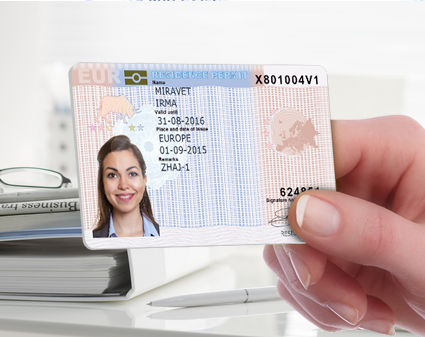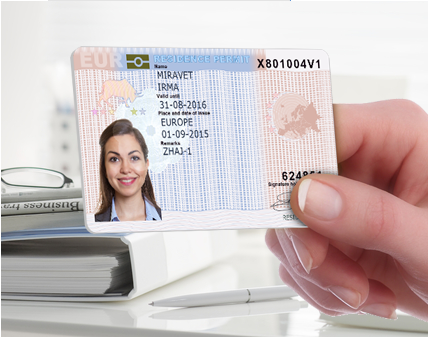Blue Card (European Union)
The EU Blue Card (English EU Blue Card) is issued by a Member State of the European Union evidence or proof document for the legal residence ( residence permit ) of third country nationals for the purpose of employment. The term of the Blue Card was coined by the think tank Bruegel, similar to the Green Card in the USA and with reference to the blue of the EU flag.
The EU Blue Card is based on the Directive 2009/50/EC. The EU Blue Card is to allow, in particular highly qualified third-country nationals to stay in the EU. The measures considered within the European Commission's reasons for introducing this card were the expected future shortage of qualified people in some sectors of employment and different modalities of approval in the Member States. Nevertheless, the Directive shall not affect national license requirements.
The Directive applies to third-country nationals not expressly enjoying on the basis of international obligations protection that are due to a research stay in the European Union, who arrive in the context of family reunification, which can not be deported ( more reasons in Article 3).
The holders of the EU Blue Card to the same pay as the Union citizens in a similar position be granted rights to vocational training or social assistance but are not affected, although a gender equality in social transfers is sought.
The Blue Card is limited to one to four years. The format is consistent and in accordance with Regulation (EC ) No 1030/ 2002. The Directive had to be transposed by 19 June 2011 in all States of the European Union.
Implementation of the Directive in Germany
In Germany, the Directive was transposed by the Law transposing the European Union of highly qualified Directive with effect from 1 August 2012 with the Residence Act, the Employment Ordinance and other legislation to be changed. The detailed conditions of the grant of the EU Blue Card can be found in § 19a Residence Act. The § 19 Section 1 No. 3 of the Residence a required salary, which must provide for the high -skilled, is two-thirds, in some cases ( so-called shortage occupations ) 52 % of the annual earnings ceiling of the public scheme ( § 41a of the Employment Regulation ).
In 2012, the income threshold in the general pension is 67,200 euros per year and 5,600 euros per month ( § 3 para 1 sentence 1 No. 1 of the Regulation on authoritative operands of social security for 2012 - Social Security operand Regulation 2012) and in 2013 an annual 69,600 Euro and 5,800 euros per month ( § 3 para 1 sentence 1 No. 1 of the Regulation on authoritative operands of social security for 2013 - social Security operand Regulation 2013). Consequently, the high -skilled had in 2012 a year at least 44,800 euros ( or in the case of the 52 % limit: 34 944 EUR ) derive from the employment. In 2013 it had 46,400 Euros or 36 192 euros to be, for 2014 there are 47,600 Euros or 37 128 euros.
Criticism
The benefits of the EU Blue Card for the labor market is controversial. Trade unions see it as an invitation to wage dumping. Because few new immigrants so far arrived in Germany (to end 2013 around 7,000 jobs as part of the Blue Card, of which a majority of applicants, however, already been previously found in other programs or as students at German universities in the country) is a lowering the wage limits considered.










